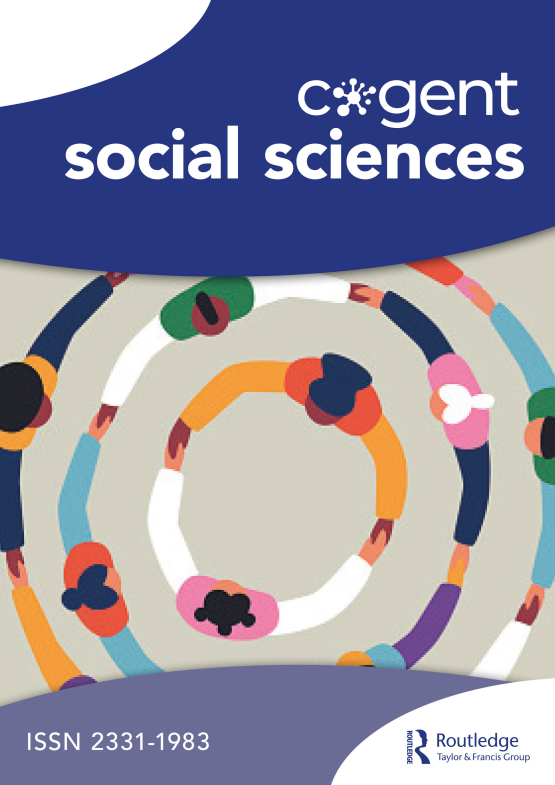Submit a Manuscript to the Journal
Cogent Social Sciences
For an Article Collection on
Flavors of informality in Eurasia (and Beyond): Shifting Moralities and Legalities
Manuscript deadline


Article collection guest advisor(s)
Dr. Abel Polese,
Dublin City University
abel.polese@dcu.ie
Dr. Gian Marco Moisé,
Tallinn University (TÜHI)
gianmarcomoise@gmail.com
Binazirbonu Yusupova,
Dublin City University
binazirbonu.yusupova2@mail.dcu.ie
Flavors of informality in Eurasia (and Beyond): Shifting Moralities and Legalities
What happens when citizens are unwilling or unable to adopt the state’s moral framework as their own? This divergence often arises when moral norms are externally imposed by the state but are not internalized by its citizens, leading to resistance, negotiation, or the formation of alternative cultural identities—especially during times of economic or political upheaval. Flavors of Informality explores these tensions through empirical case studies across Eurasia (from the Caucasus and Eastern Europe to Central Asia), analyzing the co-productive relationship between legality and illegality via contested moralities. The special issue aims to unpack how informal practices emerge where state and citizen moralities diverge, how they are shaped by transnational mobility, and how they contribute to the reconfiguration of cultural identities. Building on work by Hart (1973), Ledeneva (2013), Morris (2012) and Polese (2021), the issue foregrounds informality as a site of everyday governance, resistance, and meaning making.
Understanding informality is crucial as it challenges dominant assumptions that informal practices are marginal, transitional, or inherently negative. Instead, informality often emerges as a durable and creative response to inadequate or absent state regulation. Far from being limited to survival or criminal activity, informal practices can be empowering, morally justified, and socially accepted. They reveal how individuals negotiate authority, legitimacy, and morality in everyday life, often performing “infrapolitics” (Scott, 2012)—quiet, widespread acts that influence governance and societal norms. This special issue will explore how informal practices not only bypass but also substitute or complement state functions. In doing so, it highlights how informality shapes state-society relations and reveals the fluid boundary between legality and illegality, the formal and the informal. Understanding these dynamics is key to analyzing how people cope, resist, and organize when state presence is insufficient, irrelevant, or contested.
This Article Collection explores informality as a complex and morally contested space where everyday practices challenge or circumvent state authority. We welcome articles that investigate: (1) Everyday governance and informality, including non-compliance with state norms (e.g., tax morale, shadow economies, invisible labor), and how these are shaped by gender, ethnicity, and borderland positionalities; (2) Formal vs. informal entrepreneurship, examining solidarity networks, the blurred legal-illegal divide (e.g., sex work, marijuana, alcohol), and how legality shifts across contexts; (3) Political informality, which considers how power is enacted at grassroots, middle, and elite levels, including through ecological activism and radical reterritorialization efforts. We seek contributions grounded in empirical research from Eurasia and beyond, and welcome original research articles, and case studies that engage critically with informal practices as modes of governance, resistance, and economic adaptation.
Dr. Abel Polese is a Senior Research Fellow with DCU Institute for International Conflict Resolution and Reconstruction. He has been a Marie Curie Fellow at the Technical University of Dresden, Germany (2006-2008) and the University of Edinburgh, Scotland (2008-2011). In 2012-2013 he worked as a policy analyst for the European Commission (DG Research). So far, Abel has been awarded funding for over nearly €16 million and his project “Sustainable Development in Cultural Diversity” received the Global Education Award by the Council of Europe in 2011. His research interests focus on theory and practice of development, post-Soviet politics and Societies, Eurasia, and South East Asia.
Gian Marco Moisé in an Italian PhD graduate in political science and international relations specialised on energy, informality, corruption, Central Asia and Eastern Europe with two masters: one in international relations with a focus on the Former Soviet Union, and the other on human rights and democracy in the Western Balkans. His research interests focus on philosophy, energy, corruption, informality, politics, inter-ethnic relations, nationalism, migratory studies, and gender.
Binazirbonu Yusupova is a doctoral candidate and Marie Curie Early-Stage Researcher at Dublin City University’s School of Law and Government. She is part of the EU-funded MARKETS project (Innovative Training Network: Mapping Uncertainties, Challenges, and Future Opportunities of Emerging Markets), supported by a Marie Skłodowska-Curie Actions (MSCA) grant under Horizon 2020. Her doctoral research explores the intersections of informality, precarity, patriarchy, and capitalism in Uzbekistan, employing feminist political economy and ethnography to centre the experiences of women and marginalized communities in Uzbekistan’s shifting political-economic landscape.
The Guest Advisors do not have conflicts of interest to disclose.
For more information about this Collection, please contact the Commissioning Editor, Dr. Molly Cole, at molly.cole@taylorandfrancis.com.
Benefits of publishing open access within Taylor & Francis
Global marketing and publicity, ensuring your research reaches the people you want it to.
Article Collections bring together the latest research on hot topics from influential researchers across the globe.
Rigorous peer review for every open access article.
Rapid online publication allowing you to share your work quickly.
Submission Instructions
All manuscripts submitted to this Article Collection will undergo desk assessment and peer-review as part of our standard editorial process. Guest Advisors for this collection will not be involved in peer-reviewing manuscripts unless they are an existing member of the Editorial Board. Please review the journal Aims and Scope and author submission instructions prior to submitting a manuscript.
